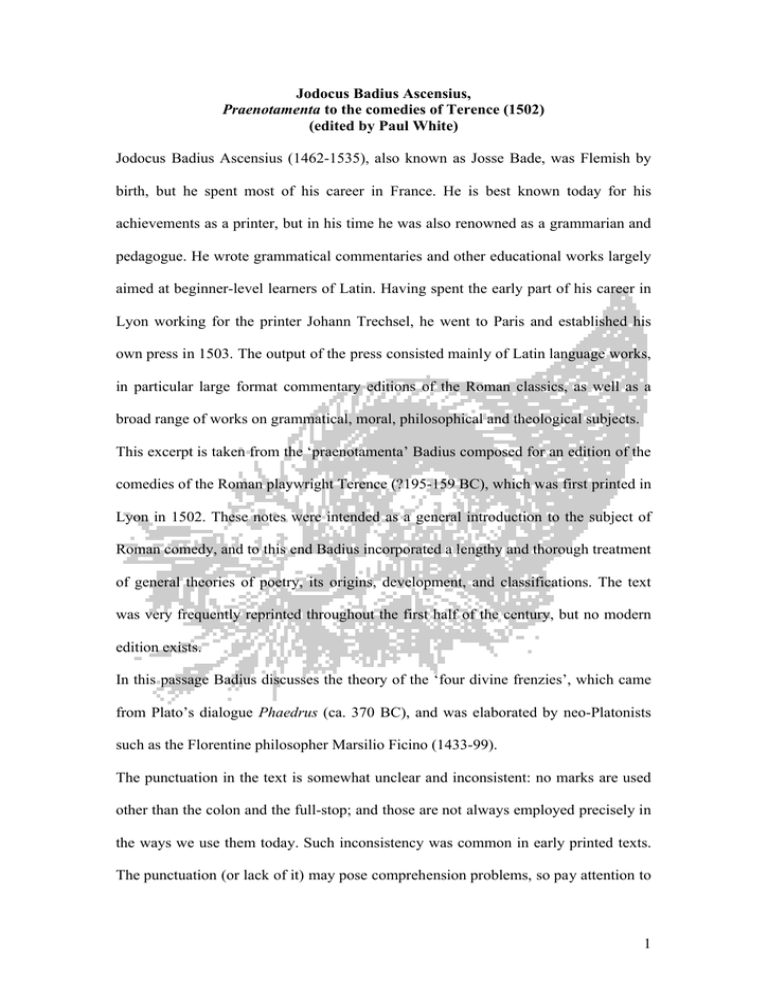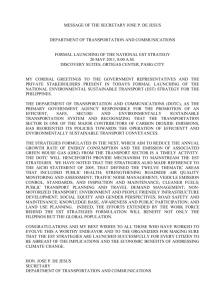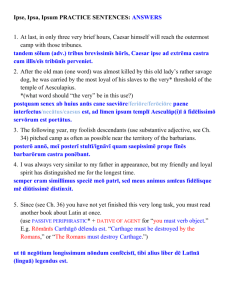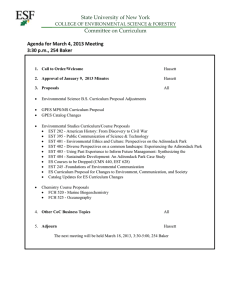Jodocus Badius Ascensius (1462-1535), also ... birth, but he spent most ... Jodocus Badius Ascensius, (edited by Paul White)
advertisement

Jodocus Badius Ascensius, Praenotamenta to the comedies of Terence (1502) (edited by Paul White) Jodocus Badius Ascensius (1462-1535), also known as Josse Bade, was Flemish by birth, but he spent most of his career in France. He is best known today for his achievements as a printer, but in his time he was also renowned as a grammarian and pedagogue. He wrote grammatical commentaries and other educational works largely aimed at beginner-level learners of Latin. Having spent the early part of his career in Lyon working for the printer Johann Trechsel, he went to Paris and established his own press in 1503. The output of the press consisted mainly of Latin language works, in particular large format commentary editions of the Roman classics, as well as a broad range of works on grammatical, moral, philosophical and theological subjects. This excerpt is taken from the ‘praenotamenta’ Badius composed for an edition of the comedies of the Roman playwright Terence (?195-159 BC), which was first printed in Lyon in 1502. These notes were intended as a general introduction to the subject of Roman comedy, and to this end Badius incorporated a lengthy and thorough treatment of general theories of poetry, its origins, development, and classifications. The text was very frequently reprinted throughout the first half of the century, but no modern edition exists. In this passage Badius discusses the theory of the ‘four divine frenzies’, which came from Plato’s dialogue Phaedrus (ca. 370 BC), and was elaborated by neo-Platonists such as the Florentine philosopher Marsilio Ficino (1433-99). The punctuation in the text is somewhat unclear and inconsistent: no marks are used other than the colon and the full-stop; and those are not always employed precisely in the ways we use them today. Such inconsistency was common in early printed texts. The punctuation (or lack of it) may pose comprehension problems, so pay attention to 1 the points at which clauses begin and end, to the ways phrases link together, and to the progression of ideas. J. Badius, Praenotamenta to the comedies of Terence (1502) Transcribed from: P. Terentij Aphri comicorum elegantissimi Comedie (Paris: J. Badius for Wynkyn de Worde et al., 1504), sig. aii(v). (full text available at EEBO) Sed quia de furore loquimur. Sciendum est vt supra diximus quod duplex est furor. malus et bonus. Malus: is est qui ex humorum perturbatione aut ex nimio immoderato circa quamuis rem studio nascitur et hominem in insaniam trahit. Bonus autem furor qui diuinitus infunditur. is est qui hominem supra hominem erigit: et deo proximum dum illo efflatur reddit. Quapropter apud platonem 5 quattuor diuini furoris species ponuntur. quas ne longus nimis fiam sic habeto. Primus est in amore atque pulchritudine. Secundus in deuotione ac mysterio. Tertius in harmonia & poesi. Quartus in vaticinio et prophetia. Primo furore antiquitas finxit venerem preesse. Secundo bacchum. tertio musas: quarto apollinem. his autem quattuor furoribus bonis: alij quattuor qui hos falso 10 imitantur opponuntur. Nam quotiens ex visibilium decore atque pulchritudine rapimur ad contemplandam diuinam pulchritudinem eius qui hec omnia fecit. incendimar quodam igni amoris atque desiderij ita spiritus noster corporis huius carcere euolasse videtur atque illi adherere qui omnium pulcherrimus est. cum quo dum animus versatur omnes corporei sensus occlusi sunt. ita vt furere et 15 insanire videamur: quem quidem furorem pauci atque adeo perfectissimi in terris percipiunt. huic amori qui ex visibilium pulchritudine ad invisibilem dei decorem desiderandum nos ducit: impedimento est amor libidinosus et lubricus quo rerum 2 que oculis cernuntur pulchritudine amanda continemur nec vltra consurgimus: et is profecto manifestus furor est. 20 [1] But since we are speaking of frenzy, it should be known, as we said before, that there are two kinds of frenzy, good and bad. The bad kind is that which arises from disturbance of the humours or from an excessive, immoderate attachment to some object, and makes men mad. Conversely the good frenzy which is imparted divinely is that which elevates man above man and brings him closest to God for as long as he is enthused with it. [5] This is why in Plato four kinds of divine frenzy are set out; to keep things brief, here they are: the first has do with love and beauty; the second with religion and mysteries; the third with harmony and poetry; the fourth with divination and prophecy. The ancients imagined that Venus presides over the first frenzy; Bacchus over the second; the Muses over the third; and Apollo over the fourth. [10] Set in opposition to these four good frenzies are another four which falsely resemble them. Now, whenever we are transported out of the grace or beauty of visible things to contemplate the divine beauty of him who created it all, we are enflamed by some sort of fire of love and desire, so our soul seems to have flown free of the prison of the body and to become attached to the most beautiful of all beings. [15] While our mind is involved with this being all our bodily senses are shut off, so that we seem to be frenzied and mad; and to be sure on earth few people, and only the most perfect, achieve this frenzy. An impediment to this love which leads us from the beauty of visible things to desire the invisible beauty of God, is lustful and deceitful love, whereby we are constrained by loving the beauty of things our eyes can see; and we do not rise beyond it: this is quite obviously a kind of madness. 3 Commentary Line 1: furore: the madness or ‘frenzy’ of poetic inspiration. Lines 1-2: a modern text would probably replace the full-stops with commas or other punctuation. Line 2: humorum: according to the medical theories of the time, illnesses were caused by an imbalance in the bodily substances known as ‘humours’: black bile, yellow bile, blood and phlegm. Line 4: diuinitus: (adv.) divinely, from heaven. Line 5: apud platonem: Plato (428-347 BC) outlined this fourfold classification of madness in the Phaedrus; Marsilio Ficino (1433-99) gave an influential interpretation of the theory in his De amore, a commentary on Plato’s Symposium. Badius may be drawing here in particular on De amore VII.14-15. Lines 5, 9-10: platonem…venerem…bacchum, etc.: proper nouns were often left uncapitalized in Latin texts of this period. Line 6: sic habeto: future imperative of ‘habeo’ in the sense of ‘know’ or ‘consider’, here with ‘quas’ (‘quattuor species’) as direct object: ‘now, know what they are’, ‘here they are’. Here the future imperative does not refer, as it normally would, to an action to be accomplished in the future, but is being used in a more generalised sense. As well as ‘habeo’, the verbs ‘scio’ and ‘memini’ may also be used in this way: cf. ‘scito’ and ‘memento’. Line 8: furore: we would expect to find ‘furori’ here, since ‘praesum’ takes the dative; possibly a printer’s error. Line 9: preesse: read ‘praeesse’. 4 Lines 9-10: venerem…apollinem: Venus, goddess of love; Bacchus, god of wine and revelry; the Muses, nine goddesses who presided over the arts; Apollo, god of prophecy and inspiration. Note the inconsistent punctuation here. Line 11: visibilium: ‘of visible things’, as distinct from the ‘invisibilia’ of the divine realm. Line 12: ad contemplandam diuinam pulchritudinem: Badius repeatedly uses gerundive constructions in this passage. The gerundive construction is twice used in the accusative after ‘ad’ (purpose) and once in the ablative with no preposition (instrument or cause). Line 12: hec: read ‘haec’. Line 13: incendimar: ‘incendimur’ (printer’s error). Line 14: carcere: the concept of body as ‘prison of the soul’ is from Plato: see for example the Phaedo. Line 14: adherere: read adhaerere. Line 15: cum quo: i.e. with the divine being qui omnium pulcherrimus est. In classical Latin ‘versor’ usually takes in+abl. Lines 17-19: huic amori…continemur: it will be helpful to break this down into its constituent clauses. Main: ‘huic amori…impedimento est amor libidinosus et lubricus’. Subordinate: ‘qui…nos ducit’. Subordinate: ‘quo…continemur’. Subordinate: ‘que…cernuntur’. Lines 17-18: ad invisibilem dei decorem desiderandum: gerundive construction of purpose, after ‘nos ducit’. Line 18: impedimento est: predicative dative, with ‘huic amore’ the dative of reference, and ‘amor libidinosus’ the subject: ‘lustful love is an impediment to this love, which…’ The punctuation may be misleading here. 5 Line 18: quo: ‘whereby’. Line 19: que: read ‘quae’. Line 19: pulchritudine amanda continemur: ‘we are wholly taken up with loving the beauty (of things which…)’. Although the 1504 edition prints ‘amandi’ here, other editions correct this to ‘amanda’. 6





